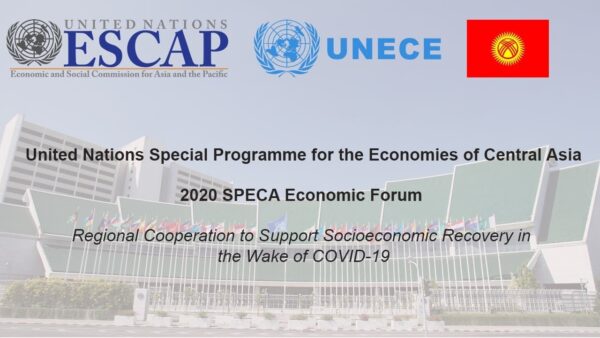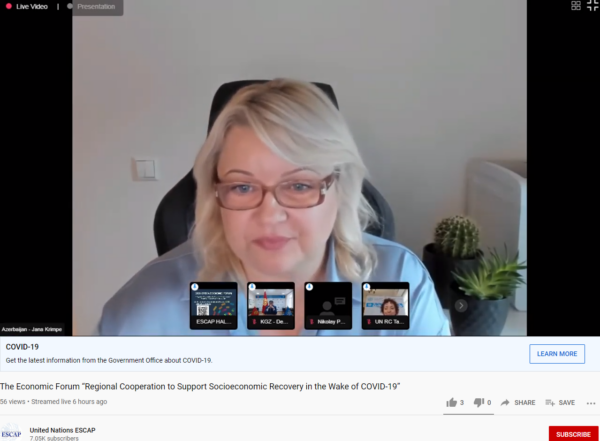Digital Trade Hub of Azerbaijan and “Asan Imza” were discussed at the United Nations 2020 SPECA ECONOMIC FORUM
On 18-19 November the United Nations Economic and Social Commission for Asia and the Pacific (ESCAP) along with the United Nations Economic Commission for Europe (UNECE), and the Heads of Delegation of the United Nations Special Programme for the Economies of Central Asia (SPECA) held the 2020 SPECA ECONOMIC FORUM on “Regional Cooperation to Support Socioeconomic Recovery in the Wake of COVID-19” in virtual modality.
The ultimate objectives of SPECA are to increase economic cooperation in the SPECA region; integration of the SPECA participating countries into the world economy; and platform provision for cross-border cooperation with the prospects of achieving Sustainable Development Goals (SDGs). The economic crisis, caused by the COVID-19 pandemic, has severely affected societies and countries around the world, including the SPECA countries. Due to the crisis, a production break, and a huge decrease in employment and population income were observed. Along with that, self-isolation and necessary lockdown measures escalated socioeconomic challenges and substantially reduced the forecast of SDG achievements.

Representatives from the SPECA participating countries: Afghanistan, Azerbaijan, Kazakhstan, Kyrgyzstan, Tajikistan, Turkmenistan and Uzbekistan provided their valuable reports and presented their views related to the topic.
Mr. Vusal Gasimli – the Executive director of the Center for Economic Reforms Analysis and Communication of the Republic of Azerbaijan delivered a speech on the government’s recovery plans for two significant periods: post-COVID and post-conflict times. He brought forward the new strategic roadmaps to be carried out after the full liberation of Azerbaijani lands. Mr. Gasimli brought up the significance of the digital technologies implemented in the country: “Azerbaijan created Cross-Border Trade Facilitation and Paperless Trade infrastructure which helps inclusiveness and efficiency. The electronic Residency and mobile Residency program of the Digital Trade Hub of Azerbaijan allow entrepreneurs around the world to set up and run a location-independent business in Azerbaijan. These programs also allow users to access the cross-border e-services of the Digital Trade Hub through government-issued digital identities. It should be mentioned that no one is left behind from our technological strategy and the Digital Trade Hub covers all stakeholders – public and private sector entities and it has a big role for sustainable transformation.” Mr. Gasimli also noted another innovative project – azexport.az, which represents a vast digital marketplace of Azerbaijani goods and services with which Azerbaijani businesses can reach new markets and enlarge trade & export.
Another representative from Azerbaijan, Mrs. Jana Krimpe, the CEO and Founder of B.EST Solutions Company – the operator of Asan Imza and the Partner of the Digital Trade Hub of Azerbaijan (DTH). Mrs. Krimpe provided a comprehensive presentation on the implementation of DTH in the Session III: Cross-Border Trade Facilitation and Paperless Trade for Inclusive and Efficient Recovery. DTH represents a Public-Private Partnership Consortium between the Center for Analysis of Economic Reforms and Communications, PASHA Bank, B.EST Solutions and AzerTelecom. DTH is a hub where government and private sectors meet to create a favorable business environment for digital nomads, freelancers and entrepreneurs. The presenter stressed the impact of this project both in the region and around the world. Mrs. Krimpe emphasized that further advancement of DTH will uninterruptedly reinforce the recovery of the country during the post-COVID period with the use of digital technologies in the social, economic and financial sectors. The panelist additionally noted the m-Residency program – “We are also very proud of launching the m-Residency program, which is the first of its kind in the world, and the second virtual residency program after Estonia’s e-Residency, which presents the significant possibility to involve every single person in the world to participate in our economy.” With this program, one can run a location independent company in Azerbaijan and benefit from major banking services. Jana Krimpe also mentioned that the liberation of Azerbaijani lands from Armenian occupation will start the new era of economic growth and a significant acceleration of cross-border paperless e-trade facilitation activities.

She also mentioned the impact of the pandemic – “… during COVID-19 the amount of online transactions was significantly raised and it involved all players in the country. So, they started to quickly deliver remote onboarding services. The government reacted very fast and created a significant number of new online-services to serve people in the lockdown situation.” She also specified that Azerbaijan’s case can be a good example to other countries for its quick reaction in such emergency situations. Mrs. Krimpe stressed the fact that political will is extremely important for the facilitation of e-trade. The government’s role is vital in developing infrastructure, e-trade and & cross border services.
With respect to abovementioned facts, Ms. Sezin Sinanoglu, the United Nations Resident Coordinator in Tajikistan stated that learning about the innovative implementation of the m-Residency program will be an interesting example for other countries. “…. There is a lot of expertise and innovation going on. It is a great opportunity to learn from each other. To take a note of who has what… A very-very strong welcome for our colleague from B.EST Solutions from Azerbaijan. A cooperation directly with the private sector: they know the solutions; they have ideas and proposals for the solutions. Let’s please bring them onboard to have that dialog to know what they need to trade”.
Mr. Yann Duval, Chief, Trade Policy and Facilitation, ESCAP also provided a valuable comment regarding the Azerbaijani representative presentation – “…Azerbaijan is one of the top world performers in digital and sustainable trade facilitation.”
The detailed information about the session can be found here.
